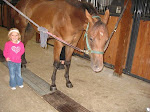Although we have received some much needed rain, the damage done to most pastures is severe. To repair the pastures, it will require additional rain, cooler temperatures, and a lot of TLC. The TLC includes, fertilizing, reseeding, and to avoid overgrazing what grasses are left. If you are, in fact, grazing the ailing pastures, care should be taken to avoid nitrate poisoning with your animals. High levels of nitrates are common in plants during times of drought. Nitrogen is naturally found and manually added to our soil and is used by plants in growth and production. Nitrogen is picked up by plant roots from the soil and it moves up into the plant. The nitrates are then converted into amino acids, which are building blocks for plant proteins. Lack of moisture stops the flow of nitrates up the plant and the conversion to protein. The roots continue to bring nitrogen into the plant, where it accumulates. Too much unconverted nitrate can become toxic to the animals eating it.
Nitrate toxicity is not only a concern in the grasses, crops, and forages growing in the pastures, but also in the grasses and forages that have been cut and baled for hay. You should be cautious when feeding hay that was baled late Spring or during the Summer after the drought had set in, as it may contain the same dangerous levels of nitrates that could have been found in the pastures. High levels of nitrates are more dangerous for smaller animals (goats, sheep, horses) than it is for cattle. It is always better to be safe than sorry. Have your hay tested by visiting most any MU Extension offices and have a test done to check for any possible concerns.
As a result of the lack of rain, and the inability for plants to create protein, the grasses and forages become less nutritional for the animals that are grazing on them. This is a problem both with the damaged pastures, as well as, any hay that was cut and baled from the poor quality grasses from this year. Providing your animals with a protein supplement is and will be vital this fall and winter as the pastures try to recover from the hard summer and the animals are forced to consume lower quality hay.
To provide your animals with the additional protein that they are going to need, FELDMANS offers a couple of options. First, you can provide to your animals supplemental feed to increase their protein intake. Second, you can provide your animals with protein/mineral supplement tubs.
For cattle, providing them with 20% or 14% Protein Breeders cubes (sometimes called Range Cubes) or a pelleted feed, such as Nutrena's 14% Stampede or Purina's 14% Performance Stocker/Grower is a good option. Also, we offer a few different protein/mineral tubs for cattle. First, we offer a conditioning tub which is an excellent choice for cattle that could be mineral and protein deficient or for times when you know that the cattle are feeding on poor quality pasture or hay. We offer a 16% All Natural tub and a 24% Urea Protein tub from Ragland Mills and a 24% Sup-r-block tub from Purina. From Manna Pro we offer a 37% Protein block. When feeding your cattle conditioning tubs, plan on them consuming 2-4lbs per head/per day. You may see the consumption rate increase or decrease as the cattle require more or less protein and minerals. The other type of Protein/Mineral tub that we offer is called a conditioning tub. These tubs are much harder and the mineral/protein concentration in these tubs is greater. These tubs are designed to be feed to cattle as a year-round option for your heard. From Purina, we offer an All Season Wind and Rain resistant tub. From Vitalix, we offer a 22% all natural protein tub and a 20% all species tub that are good choices for cattle. When feeding the maintenance tubs, plan on the cows consuming approximately 1# per head/per day. Again, consumption rates will increase and decrease as their needs change.
For horses, we offer a wide range of feed products that will help ensure your equine friends are receiving proper levels of protein, vitamins and minerals. To supplement their mineral and protein intake, we do offer a couple of options. In the conditioning tubs from Ragland Mills, you can give your horse the 16% all natural tub, but you should NOT give them the 24% Urea tub. From Manna Pro we offer a 37% Protein block and the Man-O-War Horse Block. In the maintenance tubs from Vitalix, you can give your horses the 22% All Natural tub, the 20% All Species Tub. From Vitalix we also offer an Equine Developer tub that is specifically created for horses and is an excellent option.
For your other grazing animals (goats, sheep, etc.), you can feed them Ragland Mills 16% All Natural conditioning tub, the Vitalix 22% All Natural maintenance tubs, and the 20% All Species tub. From Manna pro we offer a 37% Protein block and an 18% Sheep and Goat block. Also, for goats specifically, we stock a Goat Choice mineral/protein tub from Vitalix.
Please keep the animals safe and hopefully our pastures turn and stay green. Feel free to call and talk with any of our helpful and knowledgeable sales associates at your favorite FELDMANS Farm & Home location.
Thank you for your business and for supporting your locally, Family owned FELDMANS Farm & Home stores.
Subscribe to:
Post Comments (Atom)
.jpg)

No comments:
Post a Comment